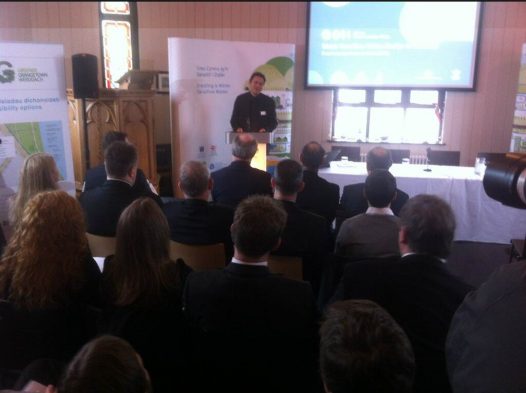Creating a Water Sensitive Wales
From the CEO
In my last engagement in the UK on Friday 8th March, I attended the launch of Greener Grangetown at Cardiff as guest speaker. This is a joint initiative by the Government of Wales, Welsh Water and the City Council of Cardiff directed at reducing stormwater inflow into the combined sewers of Cardiff to alleviate incidences of flooding and associated environmental pollution from combined sewer overflows. The initiative to retrofit the streets of Grangetown with biofiltration raingardens will establish a precinct-scale demonstration of Water Sensitive Urban Design (WSUD) in Wales. These systems will act like ‘sponges’ in the streetscape that will also beautify the streets. The significance of this project is not unlike the Lynbrook Estate in the outer suburbs of Melbourne when in the late 1990s, collaboration between the CRC for Catchment Hydrology, Melbourne Water, the former Urban and Regional Land Authority (now Places Victoria) and the City Council of Casey demonstrated at a whole-of-estate level the multiple environmental, social and economic benefits that can be realized through WSUD. The Lynbrook project provided much of the catalyst that underpins WSUD in Australia. Grangetown could well do the same in the transformation of Welsh cities and towns into Water Sensitive Cities.
 Another impressive innovation in Wales is that of Welsh Water. This is the only not-for-profit Water Company that I have come across, blending a corporate structure that foster good governance with a corporate objective that is unambiguously about public good. Revenue gained are reinvested into the company, delivering public infrastructure for the long term sustainability, resilience and liveability (my words) of the Welsh communities. Staff are highly motivated with a great sense of public service. Innovative and integrated urban water management solutions are developed without being encumbered by narrow definitions of corporate goals and financial return-on-investment around the cost of water rather than the value of water.
Another impressive innovation in Wales is that of Welsh Water. This is the only not-for-profit Water Company that I have come across, blending a corporate structure that foster good governance with a corporate objective that is unambiguously about public good. Revenue gained are reinvested into the company, delivering public infrastructure for the long term sustainability, resilience and liveability (my words) of the Welsh communities. Staff are highly motivated with a great sense of public service. Innovative and integrated urban water management solutions are developed without being encumbered by narrow definitions of corporate goals and financial return-on-investment around the cost of water rather than the value of water.
The stars appear to be aligning in Wales and Cardiff could well be UK’s first water sensitive city. What is now required is a concerted effort to gain scientific evidence on the performance of the Greener Grangetown project, science-policy partnerships and capacity building of local WSUD practitioners. The recent CIRIA publication Water Sensitive Urban Design in the UK will help as will greater participation from the local university.
Professor Tony Wong
CEO